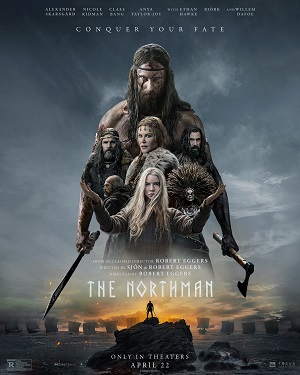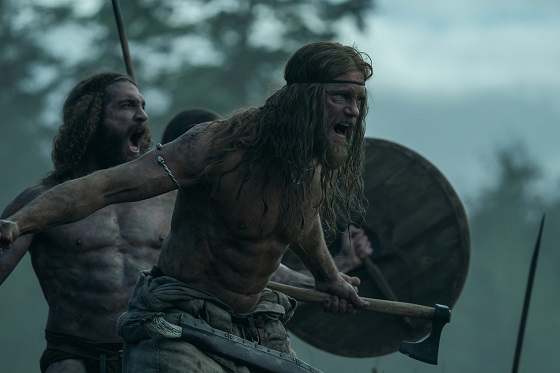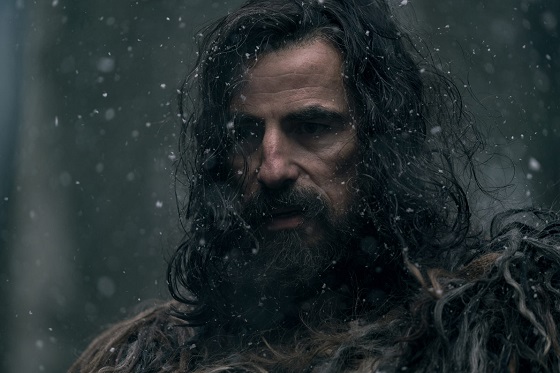

[Rating: Rock Fist Way Up]
In Theaters Friday, April 22nd
A lot of people are going to talk and write about The Northman using words like “primal” and “savage,” which it is…but nothing in it is new: not really. The mythos of western civilization is rooted in themes of fratricide, baby killing, gut spilling, and worse, connecting this movie and its early-10th century setting to a broader tapestry that looks both forwards and backwards. The result is a triumph of characterization, narrative, world-building, cinematography, wardrobe, sound/set design, and pretty much anything else a movie can get right.
Beginning in 895 AD, The Northman opens with pre-teen prince Amleth (Oscar Novak) eagerly greeting his Viking father, King Aurvandil (Ethan Hawke), upon the elder’s return from a campaign. Wounded and eager to prepare his son for the dangerous mantle of leadership that awaits him, Aurvandil consults with court jester/shaman, Heimir (Willem Dafoe), who binds father and son together on a spiritual level by way of a fealty and vengeance ritual. This bond is immediately tested when Amleth’s uncle, Fjölnir (Claes Bang), stages a coup to kill the king, marry the queen (Nicole Kidman), and kill young Amleth.
Fjölnir is only successful in the first two endeavors, with Amleth escaping into anonymity until the audience catches up with him about 15-20 years later as part of a band of independent marauders. Following his group’s raid on a village, adult Amleth (Alexander Skarsgård) learns that his mother and uncle have fled to Iceland following the collapse of Aurvandil’s borders, leaving the usurper somewhat exposed and vulnerable. Following a vision from a Seeress (Björk), and later, encouragement from a slave named Olga (Anya Taylor-Joy), Amleth resolves to fulfill his vow and duty to the slain Aurvandil.

So yeah, this is all about a prince who hopes to avenge a father slain by an uncle who subsequently marries the widowed queen. Sound familiar? Sjón and director Robert Eggers co-wrote the script based on the 13th century Scandinavian legend of ‘Amleth’ (Shakespeare’s inspiration for Hamlet), yet this is more than just a pre-boot. The Northman connects itself not just to the legacy of The Bard and the broader western cannon, but also to a history of conquest, oppression, and the poisoned legacy of kings the world over: most of whom cloaked their despotism in notions of familial, religious, or tribal duty.
Throughout the picture, Eggers challenges the audience’s assumptions about who the heroes are, with Aurvandil bringing slaves home from his conquest early on, and the adult Amleth engaging in stunningly barbaric behavior. Dressed up in Viking furs and wielding gnarly blades and clubs, this all seems carnal and barbaric, yet little about this story’s fundamentals have changed throughout the centuries. Humanity’s struggle to rein in the worst instincts of its nature is a persistent one, and whether it’s dressed up in Viking furs, Elizabethan stage costumes, or Russian uniforms, the story endures.
And while the characters in this movie speak of gods like Odin, and the glory that awaits them in Valhalla, they couldn’t be more separated from the eternal. Rooted in petty, one-dimensional modes of existence defined by black and white idealizations of honor and duty, these people are little better than the beasts that scavenge scraps from their villages and campfires. Amleth is warned early on that he’ll have to make a choice between love of his people and hate of his enemies, and there’s never any question which road the doomed prince will take (and that’s not just because we’ve seen Mel Gibson and Kenneth Branagh do all this before).

This sense of fait accompli roots it in the tragic (fitting considering the Shakespearean influence), and gives the whole production a propulsive, almost inevitable engine that revs slowly at first, yet is going at 9000 rpms by the 3rd act. Skarsgård plays Amleth with a blighted, quiet solemnity that marches in lockstep with the tone of the piece and is a fitting counter to the vibrant radiance of Taylor-Joy, the latter of whom vies for the audience’s attention any time she’s on-screen. Claes Bang and Nicole Kidman kinda sorta steal the show, however, embodying the rot, resilience, and despair that sets in after two full lifetimes of treachery, deceit, and self-delusion.
The color palette reflects colder, more earthen tones befitting its Scandinavian setting, with flat blues, greys, and browns dominating most scenes. This visual discipline allows for show-stopping set-pieces drenched in luscious oranges and reds to mark important narrative pivots, and cinematographer Jarin Blaschke uses these moments like precious bullets in a gun that only has 3 or 4 to fire (putting each in the bullseye). The way he and Eggers present the haunting beauty of Iceland as an integrated component of its brutality (for example, the shot of a burning hut at night), as part of the texture of not just the story but its setting, is remarkable.
At 130 minutes, Eggers isn’t in a rush, here, and those unfamiliar with The Witch or Lighthouse might find some of the scenes extraneous or fat, yet all of it serves a purpose, even if only to provide a little extra flavor. Indeed, a person’s preference for this kind of thing is akin to how one prefers a steak cooked, or the thickness of a burger. The Northman might be a little too bloody for some, a little too juicy, but that’s only because Eggers has left so much for audiences to sink their teeth into.
Take a big bite, it’s worth it.





Comments on this entry are closed.